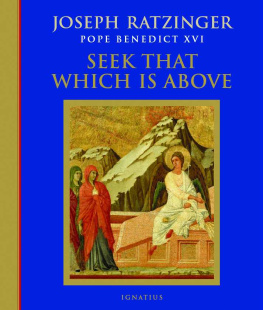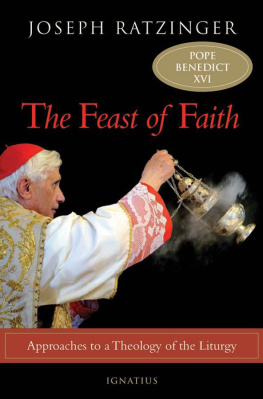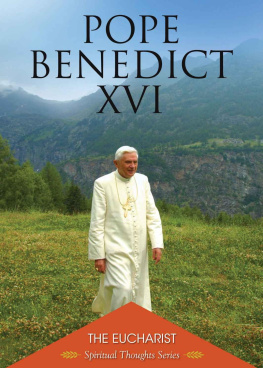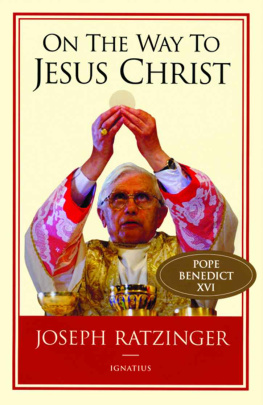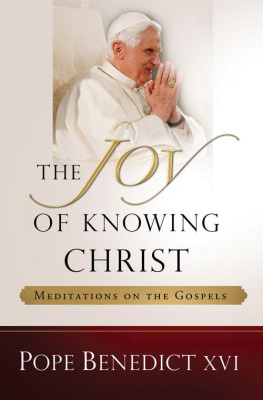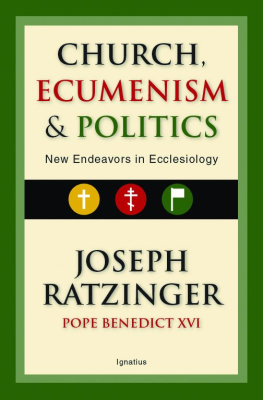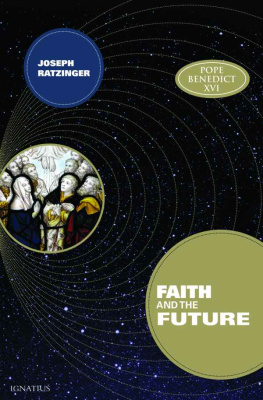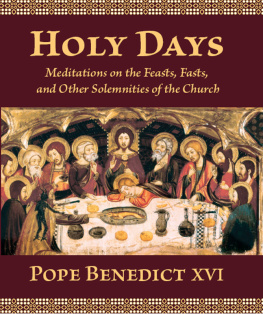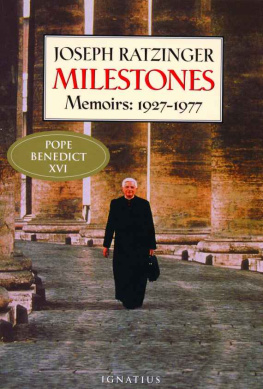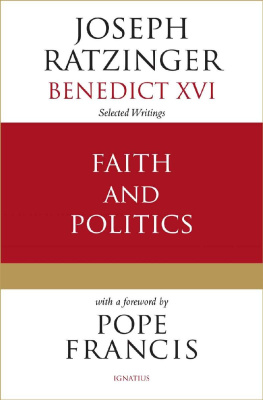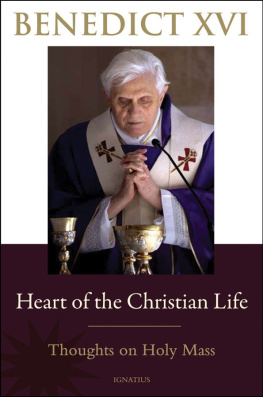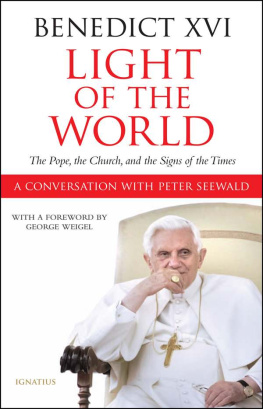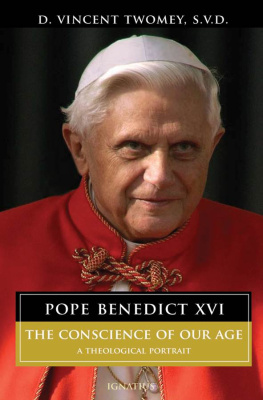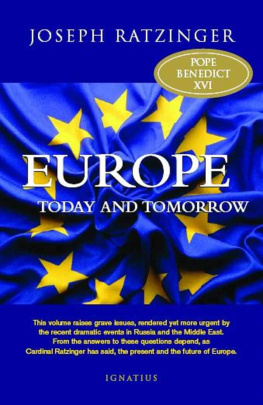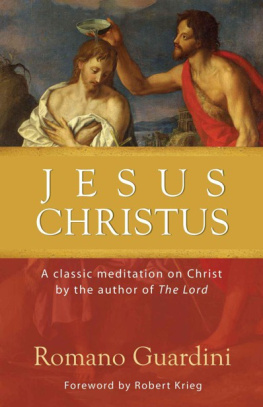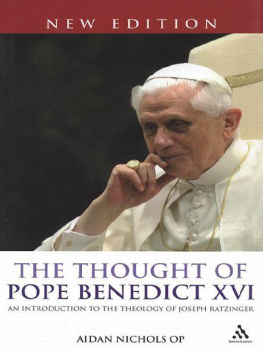SEEK THAT WHICH IS ABOVE
JOSEPH RATZINGER
(POPE BENEDICT XVI)
Seek That
Which Is Above
MEDITATIONS THROUGH THE YEAR
Translated by Graham Harrison
Second Edition
IGNATIUS PRESS SAN FRANCISCO
Original German edition:
Suchen, was droben ist:
Meditationen das Jahr hindurch
1985 by Verlag Herder
Freiburg im Breisgau
Cover art: The Three Marys at the Tomb (detail)
Panel from the back of the Maesta altarpiece
Duccio di Buoninsegna (c. 1260-1319)
Museo dell Opera Metropolitana, Siena, Italy
Scala/Art Resource, New York
Cover design by Roxanne Mei Lum
1986, 2007 by Ignatius Press, San Francisco
All rights reserved
Published with Ecclesiastical approval
ISBN 978-1-58617-187-2
Library of Congress Control Number 2006936326
Printed in Canada
CONTENTS
1. Memory Awakens Hope
2. Dare to Step Forward toward Gods Mysterious Presence
3. Stepping out of the Night
4. The Light of a New Humanity
The Encounter between Chaos and Light
The Ground of Our Freedom
1. Seek the Things That Are Above
2. Not The Cause of Jesusfor Jesus Himself Is Alive
3. Judgment and Salvation
4. Be Lifted up, O Ancient Doors
5. The Word of the Witnesses
6. In the Evening Tears, but Joy in the Morning
1. Be Awake to Receive the Power That Comes out of Silence
2. Think of Acting according to the Spirit
1. Standing before the Lord
2. Walking with the Lord
3. Kneeling before the Lord
1. A Spirituality Involving Color and Sound
2. Marian Contemplation Leads to the Heart of the Mystery
1. Going in Search
2. The Search for Real Life
3. Take Time to Rest
1. Play and Life
2. Open and Closed Churches
3. Peace
4. Concern for Gods Creation Art Credits
FOREWORD
The election of Joseph Cardinal Ratzinger to the papacy in April of 2005 was a double blessing for the Church. Not only was the Church given a wise and faithful successor to John Paul II, but she was also given all the past fruits of the prayer, reflection and scholarship of Father, then Cardinal, Joseph Ratzinger.
Interest in his writings has become much more widespread. Now more and more people are discovering the beauty and depth of his previous works.
The re-issuing of Seek That Which Is Above will hopefully let this book find an even wider audience and bear even greater fruit.
Joseph D. Fessio, S. J.
Feast of the Presentation
February 2, 2007
PREFACE TO THE
FIRST EDITION
In this small book, at the kind invitation of Herder Verlag, I am setting before the public a number of addresses that date from my preaching activity in Munich. The bulk of them were sermons and meditations for Easter; to them I have added short radio talks, which were broadcast on various occasions, both ecclesiastical and secular. As a result, there is inevitably a certain amount of repetition and overlapping, but this may help to reinforce and deepen the same thought from different sides and perspectives. Even then, compared with the magnitude of the issues raised, what I have said here is only fragmentary. I hope, however, that the very incompleteness and fragmentary nature of these pieces may encourage the reader to pursue his own thought and action along the same path.
Joseph Cardinal Ratzinger
Feast of the Assumption of Mary
Rome, 1984
REFLECTIONS IN ADVENT
I
Memory Awakens Hope
In one of his Christmas stories, Charles Dickens tells of a man who lost his emotional memory; that is, he lost the whole chain of feelings and thoughts he had acquired in the encounter with human suffering. This extinction of the memory of love is presented to him as liberation from the burden of the past, but it becomes clear immediately that the whole person has been changed: now, when he meets with suffering, no memories of kindness are stirred within him. Since his memory has dried up, the source of kindness within him has also disappeared. He has become cold and spreads coldness around him.
Goethe deals with the same idea as Dickens in his account of the first celebration of the feast of St. Roch in Bingen after the long interruption caused by the Napoleonic wars. He observes the people as they press, tightly packed, through the church past the image of the saint, and he watches their faces: the faces of the children and the adults are shining, mirroring the joy of the festal day. But with the young people, Goethe reports, it was otherwise. They went past unmoved, indifferent, bored. And he gives an illuminating explanation: they were born in evil times, had nothing good to remember and consequently had nothing to hope for. In other words, it is only the person who has memories who can hope. The person who has never experienced goodness and kindness simply does not know what such things are.
Recently a counselor who spends much of his time talking with people on the verge of despair was speaking in similar terms about his own work: if his client succeeds in recalling a memory of some good experience, he may once again be able to believe in goodness and thus relearn hope; then there is a way out of despair. Memory and hope are inseparable. To poison the past does not give hope: it destroys its emotional foundations.
Sometimes Charles Dickens story strikes me as a vision of contemporary experience. This man who let himself be robbed of the hearts memory by the delusion of a false liberationdo we not find him with us today, in a generation whose past has been poisoned by a particular program of liberation that has stifled hope? When we read of the pessimism with which our young people look toward the future, we ask ourselves, Why? Is it that, in the midst of material affluence, they have no memory of human goodness that would allow them to hope? By outlawing the emotions, by satirizing joy, have we not trampled on the root of hope?
These reflections bring us straight to the significance of the Christian season of Advent. For Advent is concerned with that very connection between memory and hope which is so necessary to man. Advents intention is to awaken the most profound and basic emotional memory within us, namely, the memory of the God who became a child. This is a healing memory; it brings hope. The purpose of the Churchs year is continually to run through her great history of memories, to awaken the hearts memory so that it can discern the star of hope. All the feasts in the Churchs calendar are events of remembrance and hence events of hope. These events, of such great significance for mankind, which are preserved and opened up by faiths calendar, are intended to become personal memories of our own life history through the celebration of holy seasons by means of liturgy and custom. Our personal memories are nourished by mankinds great memories; in turn, it is only by translating them into personal terms that these great memories are kept alive. Mans ability to believe always depends in part on faith having become dear on the path of life, on the humanity of God having manifested itself through the humanity of men. No doubt each of us could tell his own story here as to what the various memories of Christmas, Easter or other festivals mean in his life.
It is the beautiful task of Advent to awaken in all of us memories of goodness and thus to open doors of hope.
Dare to Step Forward toward Gods
Mysterious Presence
From early times the Churchs liturgy has set words from one of the psalms at the beginning of Advent, words in which Israels Advent, the boundless waiting of that people, has found concentrated expression: To thee, O Lord, I lift up my soul; O my God, in thee I trust... (Ps 24:1). Such words may seem hackneyed to us, for we no longer attempt the adventures that lead man to his own inner self. While our maps of the earth have become more and more complete, mans inner self has become increasingly a terra incognita, an alien region, in spite of the fact that there are greater discoveries to be made there than in the visible universe.

